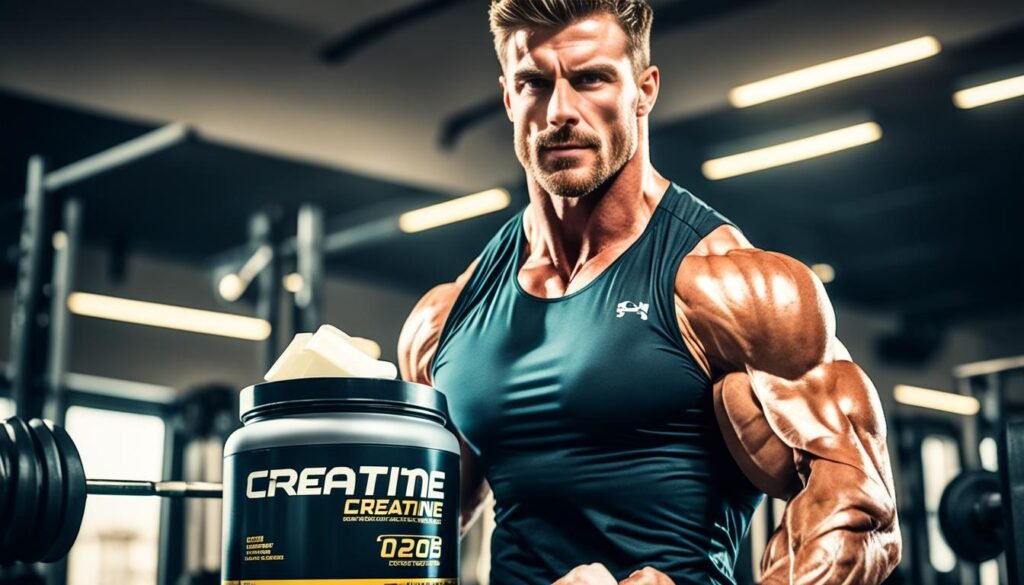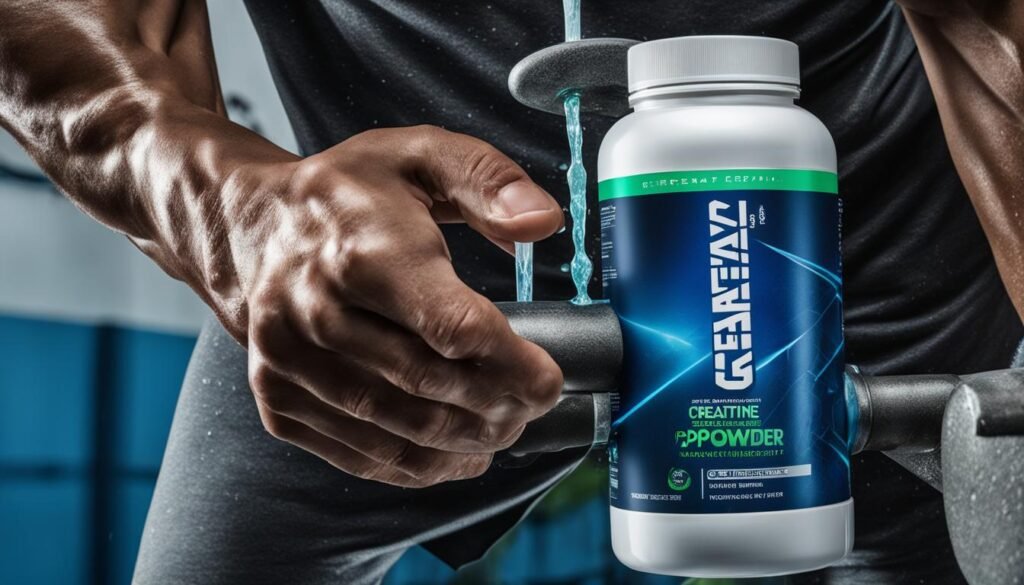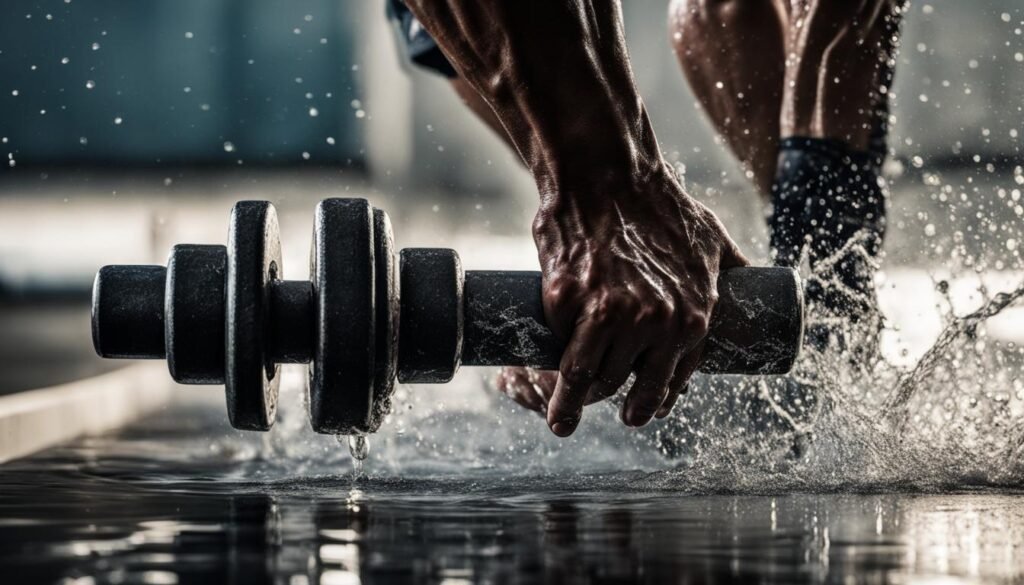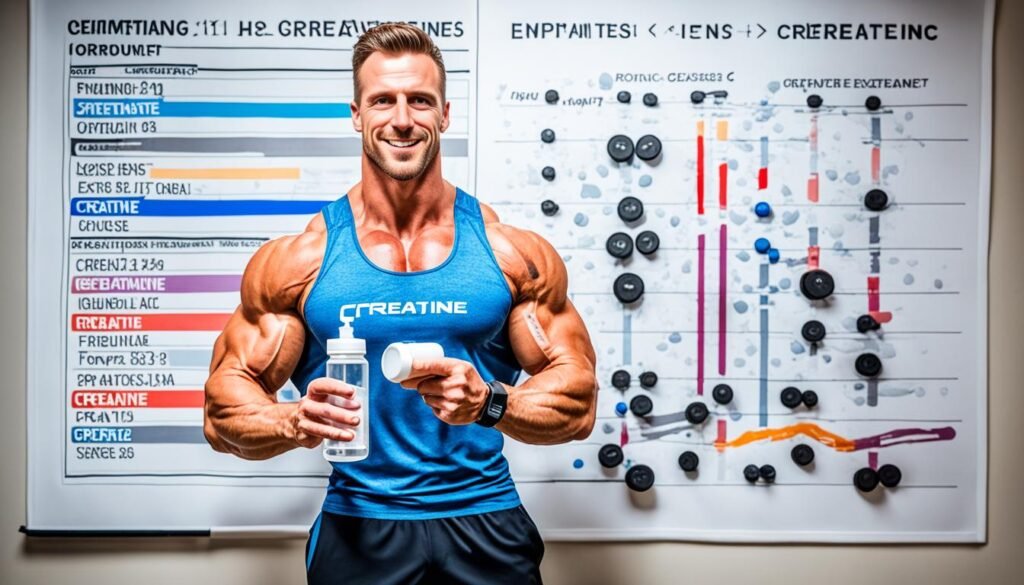It may come as unexpected that 95% of creatine found in the human body is stored in the muscles. This pivotal molecule plays a crucial role in high-powered muscular contractions and overall muscle growth, making it an essential consideration for athletes and bodybuilders alike. My exploration into the benefits of creatine unveils its remarkable capacity to not only support muscle energy during exercise but also to enhance muscle mass significantly. With a growing number of individuals turning to creatine for muscle building, it’s become clear that this naturally occurring substance is more than just a supplement—it’s a game-changer for those looking to push their physical limits.
In this article, I’ll share with you the comprehensive insights and real-world applications of creatine in promoting muscle development. Whether you’re looking to improve your performance on the field or simply optimize your workouts for maximum effect, understanding the multifaceted benefits of creatine could be the key to achieving your next level of muscle growth.
Key Takeaways
- 95% of the body’s creatine is stored in our muscles, highlighting its importance in muscle physiology.
- Creatine supplementation can significantly augment muscle energy and performance during exercise.
- Regular use of creatine can lead to substantial gains in muscle mass and strength.
- Creatine for muscle building extends beyond lifters to athletes seeking an edge in high-intensity sports.
- Understanding how to properly utilize creatine can optimize its impact on muscle growth and development.
Understanding Creatine and Its Role in the Body
Welcome back! In this section, we delve into the complexities surrounding creatine and its fundamental role within our bodies, specifically in bolstering physical performance and facilitating muscle mass gains. As we explore this topic, we’ll uncover the natural pathways of creatine production, its various supplemental forms, and how it acts as a powerhouse of energy during strenuous exercise.
The Basics of Creatine: Natural Production and Dietary Sources
My body, like yours, naturally synthesizes creatine, drawing upon vital organs like the liver, kidneys, and pancreas. This internal production accounts for about half of the creatine we require daily. The rest, we must obtain through our diets, especially from protein-rich foods such as red meat and fish. Through both endogenous production and dietary protein supplementation, creatine becomes available in the bloodstream and is transported to our muscle tissues, playing a key role in energy metabolism.
Different Forms of Creatine Supplements
For those looking to achieve significant muscle mass gains, creatine supplementation comes in handy. The market offers creatine in many forms—from powders to chewable tablets—to suit different preferences and lifestyles. Personally, I look for products that deliver pure creatine monohydrate, as research shows it promotes optimal absorption and efficacy in increasing muscle creatine stores.
How Creatine Fuels Muscles During Exercise
When you and I engage in high-intensity exercise, our muscles demand a rapid source of energy—a demand that creatine is uniquely equipped to meet. By increasing the availability of ATP, the primary energy currency, creatine enables continued high-power performance. This is particularly apparent during short, explosive bouts of exercise like sprinting or weightlifting, where immediate energy supplementation is crucial.
As we journey through the fascinating landscape of creatine’s impact on the body, we’ll explore further the relationship between creatine supplementation, muscle mass gains, and whether dietary protein supplementation can complement these effects for fitness enthusiasts and athletes alike.
Creatine Monohydrate: The Gold Standard for Supplementation

When it comes to enhancing athletic performance, particularly in terms of increasing power output, creatine monohydrate emerges as the substantial frontrunner. Its well-documented benefits have made it a staple in the realm of sports nutrition, earning it the nickname “the gold standard” among creatine supplements for athletes. My exploration into this potent compound reveals why its acclaimed status is well-deserved and how its effects stand out from other forms.
Why Creatine Monohydrate is Preferred by Athletes
My curiosity for the wide-standing preference for creatine monohydrate among athletes led me to delve into its advantages. The essence of creatine supplementation for athletes lies in its ability to saturate the muscles with a high-quality form of creatine that is readily absorbed and utilized. This increases the capacity for high-intensity work and supports greater strength, which is essential for sports that require quick, explosive movements. Furthermore, the reliability and safety profile of creatine monohydrate are validated by authoritative entities like the International Olympic Committee and the NCAA, enhancing its credibility and acceptance in the competitive athletic community.
Comparing Forms: Creatine Monohydrate vs. Others
In my investigation of various creatine forms, it became evident that while numerous variants exist, such as creatine ethyl ester and buffered creatine, they often fall short compared to the monohydrate form. Creatine monohydrate, in my findings, has a superior absorption rate and has been proven to lead to significant improvements in strength, muscle mass accumulation, and overall performance. One critical distinction is the research-backed potency that creatine monohydrate holds, which not all alternative forms can claim. As I understand, the efficacy of creatine monohydrate in promoting muscle hypertrophy and enhancing energy production during resistance training is unmatched, making it the favored choice among fitness enthusiasts and athletes alike.
To conclude, the empirical evidence underscores that creatine monohydrate stands unrivaled in its capacity to amplify athletic performance. The simplicity, effectiveness, and safety it offers have rightfully earned it the prestigious reputation it holds today among supplements designed for athletes aiming to boost their power output and muscle strength.
How Creatine Supplementation Fosters Muscle Growth
As someone deeply immersed in the world of fitness and nutrition, I’ve observed firsthand the remarkable effects of creatine supplementation on improving muscle performance and muscle growth. Research consistently links creatine use with the ability to perform higher intensity workouts, leading to greater gains in muscle strength and size.
The benefits of creatine supplementation stem from its role in resynthesizing adenosine triphosphate (ATP), the primary energy carrier in muscle cells. During high-intensity training, ATP is consumed rapidly, and here is where creatine shines. By increasing the phosphocreatine stores within muscles, creatine ensures a quick replenishment of ATP, which is vital for sustained muscular contractions.
Moreover, creatine is known for its property of cell volumization, which facilitates a more conducive environment for muscle growth. This process, coupled with its ability to enhance the levels of growth-promoting hormones such as IGF-1, catalyzes the synthesis of new muscle fibers and supports hypertrophy.
It’s important to note that the creatine supplementation benefits extend beyond mere energy supply. One of the key advantages is the muscle’s enhanced capacity to endure prolonged strain, allowing athletes to execute more repetitions and lift heavier weights. This increased workload is a critical factor in driving muscle growth over time, paving the way for significant muscle development and performance improvements.
- Increased muscle ATP regeneration
- Cell volumization for muscle growth
- Stimulated protein synthesis
- More extensive and intensive workout capacity
Therefore, for those aiming to elevate their muscle-building efforts, incorporating creatine into their supplement regimen can be a game-changer. Its scientifically-backed capacity to enhance both the quality and intensity of workout sessions makes creatine a staple in the diet of dedicated athletes seeking substantial gains.
Enhancing Muscle Strength and Power Output with Creatine

My experience with creatine has been particularly transformative when it comes to enhancing muscle strength and increasing the efficiency of my workouts. Over the years, the incorporation of this powerful supplement has worked wonders, especially during short bursts of high-intensity resistance exercises. Let’s explore how creatine can boost your workout performance and the long-term strength gains it can foster with consistent use.
Impact of Creatine on Short-Duration, High-Intensity Exercise
One cannot deny the profound creatine benefits that manifest during intense gym sessions. Creatine’s ability to increase the body’s stores of phosphocreatine aids in the production of ATP, the energy currency of the cells. This process is crucial during high-powered exercise sprints, where quick and explosive energy is needed. I’ve noticed a considerable difference in my performance during repetitive lifting and sprinting bouts, aligning with research that indicates improvements in power output by an average of 5%.
Long-Term Strength Gains from Consistent Creatine Use
Persistence is key, and with ongoing creatine supplementation, I’ve achieved not just momentary performance boosts but also significant long-term strength growth. This consistent intake has been linked to a sizeable increase in muscle phosphocreatine, allowing for prolonged intense workout sessions and, consequently, greater muscle hypertrophy. It is the gradual yet consistent elevation in strength that has been most beneficial for myself and many other athletes committed to their fitness goals.
Overall, the relentless pursuit of peak physical form is undeniably complimented by the strategic use of creatine. Whether it’s pushing for that extra rep or edging past previous power benchmarks, creatine has proven to be an indispensable ally in the quest for optimal strength and performance.
Benefits of Creatine in Muscle Growth
My examination of the role of creatine in muscle development has revealed compelling insights. Particularly, creatine in muscle growth has been a game-changing supplement that supports the quest for muscle mass gains. The impact of creatine supplementation effects cannot be overstated, especially when combined with structured workout plans. From my research, it’s evident that creatine significantly outmatches other nutritional aids aimed at increasing muscle mass. Moreover, its efficacy is not limited to a specific demographic—it benefits novices and seasoned athletes alike.
Highlighting the importance of creatine for groups with traditionally lower creatine stores, such as vegetarians and vegans, studies indicate that they may experience even more profound improvements in muscle mass and strength. This underlines the inclusivity of creatine as a muscle-building aid, providing a universal benefit that spans across different dietary practices.
| Participant Profile | Creatine Impact on Muscle Mass | Creatine Impact on Muscle Strength |
|---|---|---|
| Beginners | Significant initial gains | Noticeable increase in starting strength |
| Advanced Athletes | Continued muscle growth | Enhanced peak strength levels |
| Vegetarians/Vegans | Marked muscle mass gains | Pronounced strength improvements |
It’s clear to me that irrespective of one’s dietary choices, creatine supplementation can play a pivotal role in the journey toward building a stronger, more muscular physique. For those with dietary restrictions or preferences that lead to reduced natural creatine levels, such as plant-based eaters, the introduction of creatine as a supplement can be particularly transformative.
As someone who has experienced the creatine supplementation effects firsthand, I can attest to its potency in augmenting training outcomes. The synergy between consistent training and strategic creatine intake is undeniably effective in achieving desired physical enhancements.
- Boosts ATP production during high-intensity workouts
- Enhances rapid energy availability
- Promotes cellular hydration and muscle recovery
- Increase in muscle fiber size and overall muscular volume
Embracing the right supplementation strategy, including the timing and dosage of creatine has allowed me to witness substantial progress in both my clients’ and my own muscle development. The empirical evidence aligns with these experiences, serving as a testament to the profound impact that creatine can have when aiming to boost muscle mass and strength.
The Role of Creatine in Muscle Recovery and Performance

In my exploration of supplements, I’ve discovered that creatine is more than a muscle-building aid; it’s also instrumental in enhancing muscle recovery after strenuous workouts. The significance of creatine and muscle recovery lies in its ability to replenish energy stores and reduce the time needed for muscles to repair themselves, thereby accelerating the overall recovery process.
Reducing Muscle Damage and Enhancing Recovery
While many associate creatine with increased muscle mass, its profound impact on muscle performance post-exercise often goes unnoticed. By decreasing muscle protein breakdown during recovery periods, creatine ensures that the hard-earned gains are not lost. Additionally, better cell hydration attributed to creatine supplementation is thought to contribute to improved muscle repair and reduced soreness.
How Creatine Benefits Athletic Performance Beyond Muscle Building
My engagement with athletes has shown me that those who add creatine into their regime not only build muscle but also experience a clear boost in performance. This robust response arises because creatine provides a rapid and readily available energy source for muscle contractions during high-intensity intervals, greatly enhancing athletic capability.
Here’s a table that succinctly showcases creatine’s role in recovery and performance, making it easy to understand why it’s a staple in many athletes’ dietary supplements:
| Benefit | Explanation | Impact on Athlete |
|---|---|---|
| Rapid Energy Restoration | Increases phosphocreatine stores for quick ATP turnover | Enhanced ability to perform high-intensity workouts |
| Muscle Soreness Reduction | Improves cell hydration, reducing inflammation | Shorter recovery periods, quicker return to training |
| Decreased Protein Breakdown | Inhibits catabolism post-exercise | Preservation of muscle mass, strength maintenance |
| Neuroprotective Properties | Promotes brain health and cognitive function | Better focus and mental clarity in performance |
In my consistent practice, I emphasize that a comprehensive approach to fitness should not overlook the integral role that supplements like creatine play in not only building but maintaining muscle health and performance. With ongoing research into creatine and muscle recovery, the future of sports nutrition looks bright, promising athletes even greater enhancements in recovery and athletic performance.
Safety and Efficacy: Debunking Myths About Creatine Use

As a trusted voice in the wellness and fitness community, it’s crucial to address the pervasive myths about creatine that may mislead or even concern prospective users. Ensuring readers are well-informed about creatine safety and creatine efficacy fosters an environment where supplements can be used to their full advantage, backed by science and free from unfounded fears.
Misconceptions About Creatine and Kidney Health
One of the most stubborn misconceptions I’ve encountered relates to the impact of creatine on kidney health. It’s time to set the record straight: reputable studies consistently demonstrate the safety of creatine supplementation, with no adverse effects on kidney function in healthy individuals. The confusion typically arises from creatine’s role in creatinine production, a compound filtered by the kidneys, which is often mistakenly equated with causing harm.
“When used responsibly and within recommended guidelines, creatine has been shown to be a safe and effective supplement for elevating athletic performance and aiding in recovery.”
However, for those with pre-existing kidney issues, it’s a different conversation—one that should take place in a healthcare provider’s office, not the court of public opinion.
Understanding Who Should Avoid Creatine
Another point I stress is knowing who should avoid creatine. While most individuals can enjoy its benefits without concern, there are certain groups for whom creatine supplementation may require further scrutiny or avoidance:
- Individuals with pre-existing kidney conditions
- People with diabetes
- Those with liver disease
- Pregnant or breastfeeding women
- Individuals with bipolar disorder
For these populations, the interplay between creatine and their health condition can introduce unnecessary risks. I advocate strongly for consulting with a healthcare professional before starting any new supplement regimen, creatine included.
| Population | Consideration | Recommended Action |
|---|---|---|
| Individuals with pre-existing kidney conditions | Potential for altered creatinine levels | Consult with a nephrologist before use |
| People with diabetes | Possible effects on glucose metabolism | Discuss with an endocrinologist |
| Those with liver disease | Concerns about increased metabolic load | Seek advice from a hepatologist |
| Pregnant or breastfeeding women | Limited research in these groups | Talk to an obstetrician/gynecologist |
| Individuals with bipolar disorder | Risk of increased mania episodes | Consult with a psychiatrist |
By demystifying the creatine efficacy and safety narrative and staying guided by scientific evidence, individuals can make well-informed decisions about their supplement use. There’s no denying the potential that creatine holds for many to reach their fitness goals, but like any tool, it must be used with care and respect for one’s health.
Maximizing Muscle Mass Gains with Creatine Supplementation

As someone passionate about fitness and diligent with my training, I’ve learned that proper creatine dosage and creatine loading are essential for maintaining muscle creatine stores. I’ve experienced firsthand the impressive muscle mass and strength gains that can be achieved when supplementing with creatine monohydrate.
Initially, I follow a creatine loading phase, which is imperative to saturate the muscles quickly with creatine. This phase usually lasts about 5-7 days. Subsequently, I shift into a maintenance phase to keep my muscle creatine stores at their peak. It’s this strategy that has contributed hugely to my enhanced muscle growth.
While my diet includes creatine-rich foods like red meat and fish, I find supplementation to be a powerhouse for those extra gains, especially relevant for vegans or individuals who consume less meat and thus, naturally possess lower creatine stores.
| Creatine Loading Phase | Maintenance Phase | Dietary Sources |
|---|---|---|
| 20g per day, split into 4 servings | 5g per day | Red meat, seafood |
| 5-7 days duration | Ongoing | Milk, cranberries |
| Rapid muscle saturation | Prevent depletion of creatine stores | Supplements for vegetarians/vegans |
The key isn’t just the amount, but also the consistency of creatine dosage. Moreover, staying hydrated and pairing creatine supplementation with resistance training are pivotal to the successful augmentation of muscle mass.
- Ensuring a balanced diet alongside creatine supplements
- Adhering to loading and maintenance protocols for optimal results
- Mindfully maintaining muscle creatine stores for continued muscle building
In my journey, I’ve found these practices to be instrumental in achieving significant muscle gains. With creatine monohydrate, proper dosage, and loading, anyone serious about their fitness goals can make the most out of their training and supplementation.
Demystifying Creatine Dosage: How Much and When?

As someone deeply invested in fitness, I know the importance of understanding the creatine loading and creatine maintenance protocols. The journey towards optimal muscle growth is not just about hitting the weights; it’s also about supplementing intelligently. To achieve that, we dive deep into the methodology that maximizes creatine’s potential.
The Science Behind Creatine Loading and Maintenance Protocols
Initially, creatine loading is the first step to increase muscle creatine stores rapidly. In this phase, a higher creatine intake – typically around 20 grams per day divided into four servings – is recommended for 5-7 days. After this intensive loading phase, you switch to a creatine maintenance dose of 3-5 grams daily to keep your muscle stores fully saturated. This approach ensures that your muscles maintain high levels of creatine, promoting improved performance and faster muscle growth.
Optimizing Creatine Intake for Muscle Growth
The process of optimizing my creatine intake involves finely tuned timing. The best times to take creatine are immediately post-workout when your muscles are primed to absorb it, and on rest days, with a meal containing carbohydrates and protein to facilitate uptake. This not only rejuvenates my muscle energy reserves but also expedites muscle repair and growth.
Let’s not forget that while newer forms of creatine may enter the market, creatine monohydrate remains the most researched and proven form to support strength, energy production, and lean muscle gains. By focusing on precise creatine maintenance protocols, I strive to get the most out of my workouts and recovery.
Conclusion
In my exploration of the benefits of creatine supplementation, I’ve illuminated its critical role as a top-tier aid for those looking to enhance muscle mass and achieve peak muscle performance. The key to unlocking its full potential lies within optimizing creatine intake through a structured approach involving a loading phase, followed by diligent maintenance. This pattern not only promises a boost in power and strength but also supports expedited recovery time.
As someone who values health and athletic progress, I’ve observed that incorporating creatine into a well-rounded training and dietary regimen can significantly impact one’s fitness journey. Yet, it’s imperative to remain cognizant of our individual health considerations. I strongly advise consulting with a medical professional prior to initiating creatine use, especially for those with underlying health issues. Health should always be our primary concern, and a tailored approach to supplementation can ensure that we enjoy the upside without compromising our wellbeing.
Ultimately, the judicious use of creatine supplements is a game-changer for many seeking to push the boundaries of their physical capabilities. For those committed to putting in the work, creatine can be a powerful ally, paving the way toward outstanding athletic endeavors and the continuation of personal bests. My recommendation for anyone considering creatine is to do so with a clear understanding of its benefits and an appreciation for the science behind safe supplementation practices.
FAQ
What are the benefits of creatine in muscle growth?
Creatine is known to support skeletal muscle contractions, provide a steady energy supply during high-intensity exercise, and increase muscle mass and strength when combined with resistance training. It is particularly effective in creating “quick burst” energy that is essential for activities like weightlifting and sprinting, leading to enhanced muscle growth and performance.
How does creatine function in the body?
Creatine plays a crucial role in energy production. It helps store and provide energy for muscle contractions. The body produces some creatine naturally, and it is also ingested through protein-rich foods. In muscles, creatine gets converted into phosphocreatine, which can then be rapidly used to replenish ATP, the primary energy molecule used during physical activity.
What makes creatine monohydrate the preferred form of supplementation among athletes?
Creatine monohydrate is the most extensively studied form of creatine supplement and is proven to be effective in improving short-duration, high-intensity workout performance. It is relatively inexpensive, has a high purity level, and is associated with significant improvements in muscle strength, power output, and muscle mass gains.
How does creatine supplementation foster muscle growth?
Creatine supplementation supports muscle growth by increasing the body’s capacity to perform high-intensity work, aiding the body to produce more energy, and facilitating more intense training sessions. It boosts the synthesis of proteins that lead to new muscle fibers and enhances cell signaling for muscle repair and growth.
In what ways does creatine enhance muscle strength and power output?
Creatine supplementation is known to improve performance in short, high-intensity exercises such as weightlifting and sprinting. It helps in the quick regeneration of ATP, allowing for increased strength and power output during workouts. With consistent use, creatine leads to long-term strength gains and improved power output.
Can creatine assist in muscle recovery and if so, how?
Yes, creatine can assist in muscle recovery by reducing muscle cell damage and inflammation following intense exercise. It helps replenish creatine stores quickly, which is beneficial for recovery. Additionally, creatine can lead to increased cell hydration, which is thought to play a role in reducing muscle soreness and aid in muscle repair.
What are some common misconceptions about creatine and kidney health?
A common misconception is that creatine supplementation adversely affects kidney health. However, comprehensive studies have shown that creatine use, as directed, does not harm the kidneys in healthy individuals. Nonetheless, those with pre-existing kidney conditions should consult a healthcare provider before using creatine supplements.
Who should avoid taking creatine?
Individuals with pre-existing kidney, liver, or heart conditions, as well as those with diabetes, should consult their doctor before taking creatine. Additionally, pregnant and breastfeeding women, children under 18, and individuals with bipolar disorder may need to avoid creatine unless supervised by a healthcare professional.
How can you maximize muscle mass gains with creatine supplementation?
To maximize muscle mass gains, a common approach involves starting with a loading phase of creatine monohydrate to quickly increase muscle creatine stores, followed by a maintenance phase to keep these levels high. Consistent resistance training and a diet adequate in protein are also crucial for amplifying the effects of creatine on muscle growth.
What is the recommended dosage and timing for creatine supplementation?
The typical recommended dosage involves a loading phase of 20 grams of creatine monohydrate per day, split into four servings for 5-7 days, followed by a maintenance dose of 3-5 grams per day. Timing creatine supplementation close to workouts may offer additional benefits in terms of muscle uptake and performance.




